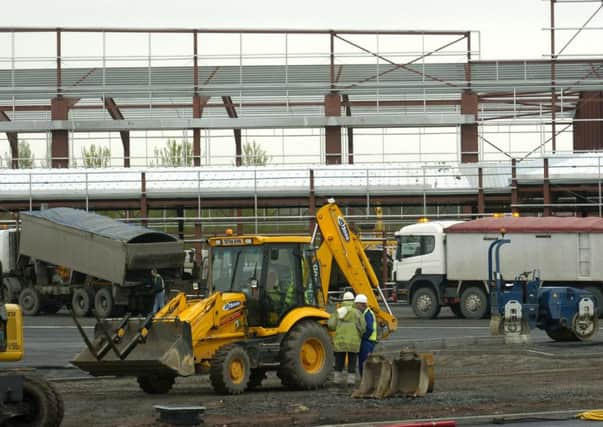Indyref2 and Brexit weigh on Scots property sector
This article contains affiliate links. We may earn a small commission on items purchased through this article, but that does not affect our editorial judgement.


Grant Thornton is calling for more consultation from political leaders over the fears the sector could lose contracts and international funding for projects because of business and political uncertainty.
The group said the construction industry raised £6.6 billion for the Scottish economy in 2014, employing thousands of people as it slowly recovered from heavy losses in the global downturn of 2009.
Advertisement
Hide AdAdvertisement
Hide AdIt said this was partly due to an increase in major public infrastructure projects, but now there were “fears that political deadlock combined with growing nervousness from overseas investors” could spark another crisis of confidence.
James Andersen, property and construction specialist at Grant Thornton in Scotland, said: “The recent business rates changes, combined with a raft of sweeping tax reforms and the ongoing skills shortage, has created a toxic mix and, quite simply, there is now no room for complacency.
“Scotland’s property and construction sector contributes billions to the economy and plays a vital role in skilled employment. Public and private sector leaders need to start a dialogue immediately and explore how greater collaboration and a joined-up strategy focused on growth can enable the industry to thrive in the medium to long term.”
His comments came as upmarket estate agent Savills revealed a rise in profits but said the fallout surrounding Brexit and indyref2 has made the commercial property market “slightly more challenging”.
Savills’ results showed that pre-tax profit nudged up 1 per cent to £100 million, helped by a strong performance in continental Europe and China.
Group revenue jumped 13 per cent to £1.4 billion, with chief executive Jeremy Helsby hailing a “record performance in 2016 despite the geopolitical distractions”.
Advertisement
Hide AdAdvertisement
Hide AdBut the firm also laid bare the impact of the Brexit vote on the key London market, with the business booking a 3 per cent fall in revenue at its UK residential arm to £124.4m, and contract exchanges falling 5 per cent in the capital.
Savills added that revenue from UK commercial transactions decreased 13 per cent to £86m against a backdrop of an overall 28 per cent fall in investment volumes.
However, it added that the collapse in the value of the pound helped mitigate the impact, with the top end of the residential market getting a boost and foreign buyers piling into the commercial market.
Nick Penny, head of Savills Scotland, said: “On the residential side of the business we have seen some very high values achieved in the past year, in hotspots around Edinburgh and Glasgow and the major centres.
“Whilst the uncertainly around Brexit and the noise about a possible indyref2 has made the commercial property market slightly more challenging, investment into Edinburgh’s office market in 2016 reached heights not seen since 2006 with £426m of transactions, 73 per cent above the ten-year annual average. Meanwhile, comparative value for money continued to drive demand for rural land in Scotland.”
He added: “I am cautiously optimistic about Scotland’s property sector in 2017, as for those looking to achieve an income return, real estate still provides a very attractive asset class.”
The central London leasing market saw a 21 per cent reduction in the take-up of City offices, while the vacancy rate in the Square Mile rose to 5.7 per cent against as rents continued to increase.
Helsby said: “We entered 2017 with a continuation of global macro-economic concerns, rising bond yields, uncertainty over the impact of Brexit negotiations in the UK and continental Europe and a new administration in the US.
Advertisement
Hide AdAdvertisement
Hide Ad“Savills is a strong and diverse global firm and we continue to look at opportunities to develop our business. We have started the year well and our expectations for the full year remain unchanged.”
Nicholas Hyett, equity analyst at Hargreaves Lansdown, said: “Savills has delivered growth despite the turmoil in the UK property market, which is testament to the fact that it’s a lot more than a high end UK estate agent these days.”